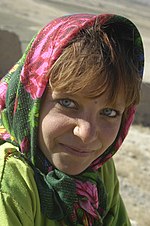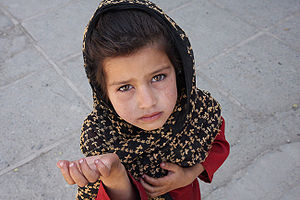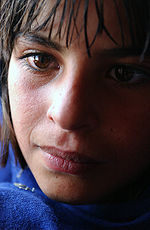
Ahmad Shah Massoud was an Afghan politician and military commander. He was a powerful guerrilla commander during the resistance against the Soviet occupation between 1979 and 1989. In the 1990s, he led the government's military wing against rival militias; after the Taliban takeover, was the leading opposition commander against their regime until his assassination in 2001.

Foreign relations of Afghanistan are handled by the nation's Ministry of Foreign Affairs, which is headed by Mohammad Hanif Atmar. He answers to, and receives guidance from, the President of Afghanistan, Ashraf Ghani.
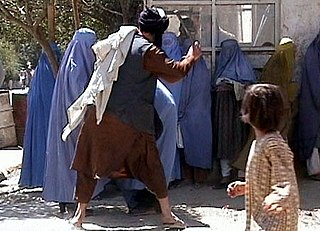
While in power in Afghanistan, the Taliban became notorious internationally for their misogyny and violence against women. Their stated motive was to create a "secure environment where the chastity and dignity of women may once again be sacrosanct", reportedly based on Pashtunwali beliefs about living in purdah.

The Soviet–Afghan War was a conflict wherein insurgent groups, as well as smaller Maoist groups, fought a nine-year guerrilla war against the Soviet Army and the Democratic Republic of Afghanistan government throughout the 1980s, mostly in the Afghan countryside. The Mujahideen were variously backed primarily by the United States, Pakistan, Iran, Saudi Arabia, China, and the United Kingdom; the conflict was a Cold War-era proxy war. Between 562,000 and 2,000,000 Afghans were killed and millions more fled the country as refugees, mostly to Pakistan and Iran. The war caused grave destruction in Afghanistan and is believed to have contributed to the Soviet collapse, in hindsight leaving a mixed legacy to people in both territories.
Gulbuddin Hekmatyar is an Afghan politician and former Mujahideen Leader. He is the founder and current leader of the Hezb-e-Islami Gulbuddin political party. He has twice served as Prime Minister of Afghanistan during the 1990s.
The following lists events that happened during 2001 in Afghanistan.
Humanitarian aid workers belonging to United Nations organisations, PVOs / NGOs or the Red Cross / Red Crescent have traditionally enjoyed both international legal protection, and de facto immunity from attack by belligerent parties. However, attacks on humanitarian workers have occasionally occurred, and became more frequent since the 1990s and 2000s. In 2017, the Aid Worker Security Database (AWSD) documented 139 humanitarian workers killed in intentional attacks out of the estimated global population of 569,700 workers. In every year since 2013, more than 100 humanitarian workers were killed. This is attributed to a number of factors, including the increasing number of humanitarian workers deployed, the increasingly unstable environments in which they work, and the erosion of the perception of neutrality and independence. In 2012 road travel was seen to be the most dangerous context, with kidnappings of aid workers quadrupling in the last decade, reaching more aid workers victims than any other form of attack.

Historically, an orphanage is a residential institution, or group home, devoted to the care of orphans and other children who were separated from their biological families. Examples of what would cause a child to be placed in orphanages are when the parents were deceased, the biological family was abusive to the child, there was substance abuse or mental illness in the biological home that was detrimental to the child, or the parents had to leave to work elsewhere and were unable or unwilling to take the child. The role of legal responsibility for the support of children whose parent(s) have died or are otherwise unable to provide care differs internationally.
The Save the Children Fund, commonly known as Save the Children, was established in the United Kingdom in 1919 to improve the lives of children through better education, health care, and economic opportunities, as well as providing emergency aid in natural disasters, war, and other conflicts. After passing a century, it is now a global movement made up of 29 national member organizations which works in 120 countries.

The Nauru Regional Processing Centre was an offshore Australian immigration detention facility in use from 2001 to 2008 and from 2012 to 2019, located on the South Pacific island nation of Nauru and run by the Government of Nauru. The use of immigration detention facilities is part of a policy of mandatory detention in Australia.
EMERGENCY is a humanitarian NGO that provides free medical treatment to the victims of war, poverty and landmines. It was founded in 1994. Gino Strada, one of the organisation's co-founders, serves as EMERGENCY's Executive Director. It operates on the premise that access to high-quality healthcare is a fundamental human right.
Virginia Haussegger,, is an Australian journalist, academic advocate for gender equity, media commentator and television presenter.
World Vision Australia (WVA) is an ecumenical Christian non-governmental organisation based in Melbourne, Australia. It is a part of the World Vision International Partnership led by World Vision International. WVA is Australia's largest overseas aid and development organisation, operating primarily to assist overseas communities living in poverty. It also carries out development work in Australia with Indigenous communities.
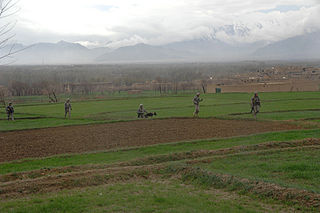
Baraki Barak District is situated in the western part of Logar Province, Afghanistan. It borders Wardak Province to the west and northwest, Puli Alam District to the north and east and Kharwar and Charkh districts to the south. The district's population is around 101,000(2006) with a majority of over 90% Tajiks. The district center is the town of Baraki Barak - the former provincial capital, located in the northern part of the district in the valley of the Logar River. Baraki Rajan is another important town of this district which lies 4 km away from district center. The district is named after the historical Ormur tribe, also locally known as Baraki.

The War in Afghanistan is an ongoing war following the United States invasion of Afghanistan that began when the United States and its allies successfully drove the Taliban from power in order to deny Al-Qaeda a safe base of operations in Afghanistan. After the initial objectives were completed, a coalition of over 40 countries formed a security mission in the country called International Security Assistance Force, of which certain members were involved in military combat allied with Afghanistan's government. The war has afterward mostly consisted of Taliban insurgents fighting against the Afghan Armed Forces and allied forces; the majority of ISAF/RS soldiers and personnel are American. The war is code-named by the U.S. as Operation Enduring Freedom (2001–14) and Operation Freedom's Sentinel (2015–present); it is the longest war in U.S. history.
Afghanistan Relief Organization (ARO) is a humanitarian organization which provides direct aid and education to those in need in Afghanistan. It runs a large technology education centre in the Afghan capital, Kabul, and is also involved in the training of midwives.

Dr. Syed Ghulam Farooq Mirranay was born in Nangarhar Province, Afghanistan in 1950. He is a senior member of the Afghan Social Democratic Party and was an elected member of the House of the People ) from 2005 to 2010. Mirranay is the official spokesperson for the Afghan Mellat Party and speaks both official Afghanistan languages, Pashto and Dari, as well as English.
Kim Nelson was an Australian artist. He lived and worked in the foothills of the Brindabella mountain range, near the Australian National Capital, Canberra. Themes such as the recurring 'Red Shawl' and other spiritually suggestive motifs put his artwork firmly in the field of Symbolism though his style does range from classical to the abstract.
Rabiah Hutchinson is an Australian Muslim and thought to be a key figure in the development of militant Sunni Islam in Australia. Hutchinson married a number of times including to members of Al Qaeda and Jemaah Islamiah and became the subject of an investigation by Australian Security Intelligence Organisation. Hutchinson traveled to the Mujaheddin camps in Afghanistan and into Osama bin Laden's inner circle and is believed to have been schooled there by the Mujaheddin. Rabiyah Hutchinson has been called the "matriarch" of radical Islam in Australia.
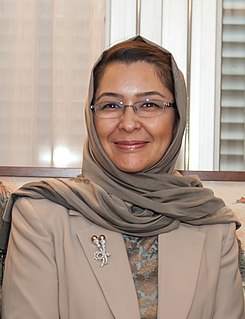
Suraya Dalil, is an Afghan physician and politician who served as Minister of Public Health from 2010 to 2014 and has been the country's Permanent Representative to the United Nations since November 2015.
